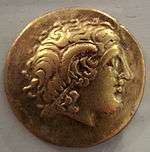Nitiobroges
The Nitiobroges (Gaulish: "the indigenous")[1] were a Gaulish tribe, dwelling around their capital Aginnum (modern-day Agen) on the middle Garonne river, where they settled during the 4th century BCE.[2]
Name
They are mentioned as Nitiobroges by Caesar (mid-1st c. BC) and Pliny (1st c. AD),[3][4] as Nitióbriges (Νιτιόβριγες) by Ptolemy (2nd c. AD),[5] and as Nisiobroges by Sidonius Apollinaris (5th c. AD).[6][7]

The name Nitiobroges means 'those who have their own country/territory, indigenous'. It stems from the Gaulish suffix nitio- ('from here, proper'), attached to brogi ('territory, region, frontier, march').[1]
The name is attested on inscriptions written on a torc with the Greek alphabet, found in Mailly-le-Camp and dated to the mid-1st century BCE.[8]
References
- Delamarre 2003, p. 235.
- Lafond & Olshausen 2006.
- Caesar. Commentarii de Bello Gallico, 7:7:2
- Pliny. Naturalis Historia, 4:109
- Ptolemy. Geōgraphikḕ Hyphḗgēsis, 2:7:11
- Sidonius Apollinaris. Epistles 8:11:1
- Falileyev 2010, p. entry 3285.
- Fages, Brieuc; Maurin, Louis. Inscriptions latines d'Aquitaines Nitiobroges. Supplement to the volume CXVIII of Revue de l'Agenais. 1, Jan-Mar 1991. p. 9
Bibliography
- Delamarre, Xavier (2003). Dictionnaire de la langue gauloise: Une approche linguistique du vieux-celtique continental (in French). Errance. ISBN 9782877723695.CS1 maint: ref=harv (link)
- Falileyev, Alexander (2010). Dictionary of Continental Celtic Place-names: A Celtic Companion to the Barrington Atlas of the Greek and Roman World. CMCS. ISBN 978-0955718236.
- Lafond, Yves; Olshausen, Eckart (2006). "Nitiobroges". Brill’s New Pauly.CS1 maint: ref=harv (link)
